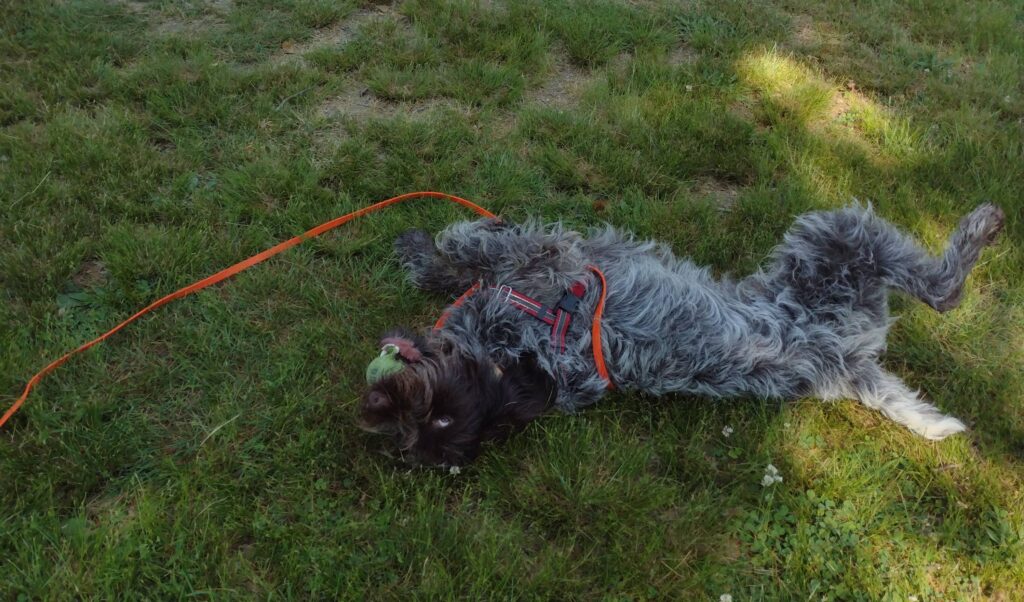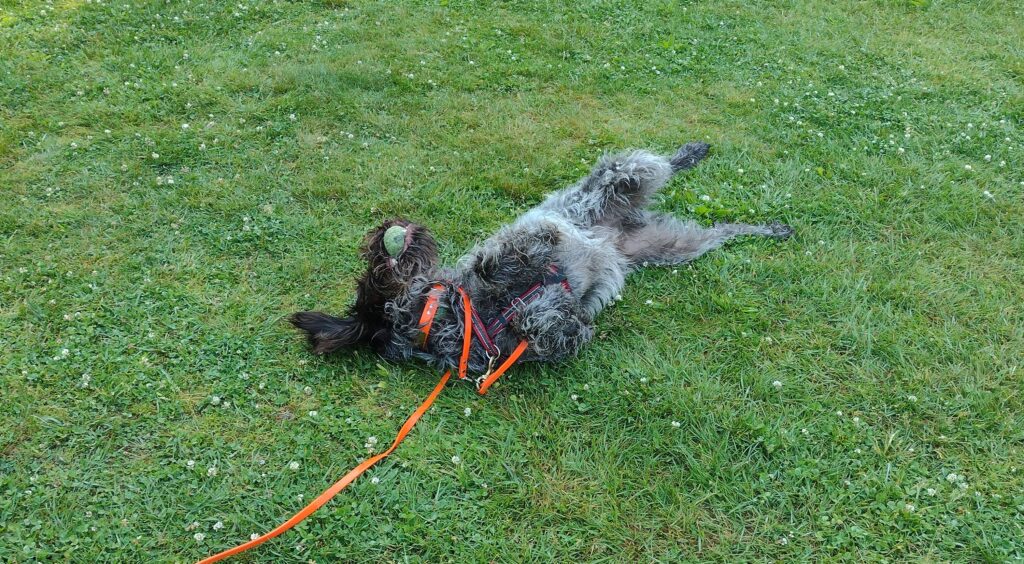Wilbur is a Wirehaired Pointing Griffon that I started working with in December 2022. One of his main struggles is reactivity. He can also get very excited when meeting new people or new people are coming into the home.

After our Initial Consultation it was obvious what the underlying cause of his behaviors were: his needs aren’t totally being met. This isn’t to shame his family. His human is a doctor and sometimes gets stuck at work for hours longer than expected. Due to some other life changes, at this moment in their lives, even with walkers and friends stopping in, he’s stuck indoors a good amount of the day.
When he travels to visit family in NY he has much more room and freedom to move and I’m told he’s a completely different dog. I have no doubt in my mind that it is true! I work with many people that live in busy, loud, overwhelming, urban neighborhoods and are always telling me once they get their dogs out into some greenspaces they are completely different.
Our first in-person lesson was hardly productive. I have no problem calling it a disaster. His family member got home from work about 20 minutes before I got there, and about four hours later than initially planned. Aside from a 30-40 minute visit from his walker Wilbur had been inside and in his crate for most of the day.
Needless to say he was WORKED UP. The last thing he needed was a training session. Wilbur needed to go outside and be a dog for at least 45 minutes.
– Side Note – One thing I try to avoid is ‘just home from work or away for long periods of time’ and/or ‘around dinner time’ sessions. The dog has most likely been home alone all day, they are excited for their human to come home, it’s dinner time, and then suddenly this other new and exciting person appears. It’s almost always too much for the dog and a waste of time for everyone.
We proceeded with the session as best as we could and by the time I got back to my car I decided we were going to have a do-over of that lesson scheduled on a day when his human wasn’t working. And that lesson was 100% better!
As much as they wanted Wilbur to not be reactive we couldn’t get there if the root cause of the problem wasn’t being addressed.
Some things that were part of his behavior plan:
- Get out of the neighborhood and away from triggers to visit greenspaces.
- I provided recommendations for quiet greenspaces to visit.
- They are lucky enough that they have a large park a four minute drive from their house that gives them plenty of space.
- Meal Enrichment using snuffle mats and slow feeders. I also recommended scattering kibble in the yard to allow him to forage like dogs naturally do.
- Flirt poles that would allow him to practice specific behaviors like chasing small critters.
- I also recommended their walker to keep the walks short and return to the yard for some flirt pole play and seeking out treats in the yard instead of a longer neighborhood walk.
Once Wilbur started getting more enrichment added to his life it made our sessions easier. He was also super trainable, food & toy motivated.
The foundation behaviors I used were from Leslie McDevitt’s Control Unleashed Pattern Games:
- Up/Down Game for engagement
- I start almost all dogs with this simple behavior
- Superbowls Game to deal with distractions
- Look at That to do just that, look. Don’t bark. Don’t stare inappropriately. Look and then let’s go play ball.
Instead of flooding Wilbur with military-like drills six feet away from other dogs we worked in the park, at the end that wasn’t super busy, where we had plenty of space to retreat if we got too close to something. And I worked at Wilbur’s pace. Some days he was fine close to distractions. One lesson he was laying in the grass resting after some play and bicycle cruised by about 10 feet away. Usually that’s a big trigger for him.
Other days not so much and he would stare too long, or go into stalk mode if a dog was too close. So I found a quiet spot where we could play ball until he was feeling better.
We are also working on leashing walking skills and some other behaviors that will help him indoors and out, like settling on a mat.
Wilbur learned the cue to go to his mat literally just by his family member saying it ONCE!
Another change we made was if they got stuck at work where they would be coming home close to lesson time we would just reschedule. It’s just as important to set up the humans for success and give them an environment where they can learn. Getting home 20 minutes before I got there after a probably 12-15 hour day is not a good environment.

For the next few months we met when we could. During our virtual calls we had many conversations about struggling to be consistent, not seeing results, is this really working, etc.
But, every call had at least one or two “but he didn’t bark or lunge at [x] on our walks”, “he’s checking in with me more”, and “we went out for a nice long hike in the woods” (instead of the 4-5 mile runs that were just conditioning him to be a long distance runner).
One part of my job is to try and find the underlying conditions that are causing the behavior we are struggling with. Sometimes I have to do that with humans, too.
Some of the things that they were struggling with
- Confidence
- Consistency
- Obedience training focused mentality
- Not like balanced/compulsion trainers, but the focus at first was more training vs identifying underlying conditions.
Once they started to have a better understanding of where his reactivity was coming from and they made changes like more time in nature to sniff and explore instead of running for five miles, things started to improve.
Wilbur wasn’t as reactive on walks. And when he did see something he wanted to focus on, it was getting easier to redirect him.
They bought snuffle mats and slow feeders and flirt poles.
Wilbur was really lacking that mental stimulation and some meal time enrichment and the chance to safely practice some specific behaviors really helped him.
Their confidence started to improve. They had a better understanding of what kind of expectations they should have of Wilbur depending on what type of activity he has had – or hasn’t had – and nobody was doing anything “wrong”.
Towards the end of our training package I was told that they were planning a big move to Denver, Colorado. And they were understandably concerned about what the environment change will do to their progress, finding a trainer to work with, greenspace, walkers, etc.
I recommended weekly visits with me to work with Wilbur while the rest of the family concentrated on all the logistics of moving over half-way across the country and being a doctor.
I wanted Wilbur to be successful. I knew picking him up and going to the park after already being in a crate for hours would cause him to be super excited.
So I picked him up early so we could get in about 15-20 minutes of play at the park before actual training started. No cues, no asking for behavior, just tossing around the tennis ball and rolling in the grass. I always reinforced his engagement with me – either with a treat or throwing the ball. I knew he was ready to work when he was engaging with me more instead of rolling in the grass and peeing on things.
Our final two lessons were actually my favorite. I got to see Wilbur’s human at their most confident!